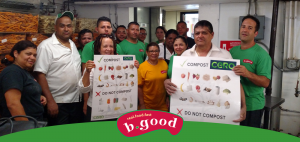
by Melanie Morgon
Can composting be part of the green economy? Let me introduce you to CERO, a bilingual, multicultural, worker-owned cooperative founded by low-income entrepreneurs. Their mission? To keep food waste out of landfills, save money for their clients, and provide good green jobs for Boston’s hard working communities. Even better — they are the new food waste source for the Needham RTS composting operation, and this new supplier is a win for all of us: the environment, taxpayers, and the RTS—not to mention CERO, its community and its customers.
As you may recall, Needham has a composting program that handles brush, leaves, and grass clippings, as well as food waste from a bulk supplier. After a two-month search, Superintendent of Solid Waste and Recycling Operations Greg Smith reported that the RTS chose CERO of Dorchester to be its new food waste source. CERO is a local cooperative composting organization that works with local restaurants, supermarkets and schools to help divert food waste from landfills. They deliver 30 tons of food waste per week and Smith has said that so far, the food waste contains nothing more than trace amounts of meat or seafood, and no bones or dairy. Smith said he is very pleased with the result, and that the new materials coming in are so clean they should eventually be able to handle all materials on site, rather than having to pay for the disposal of non-organic contaminants such as plastic and glass.
The Needham composting operation is becoming increasingly successful. Smith reported that among other changes, they have made a more efficient new layout, which saves fuel and wear and tear on the equipment, making more and cleaner compost at a lower cost. The facility now produces about 10,000 cubic yards of compost each year, up from about 3,000 cubic yards a few years ago. Even after setting aside some for residents, the Town sells as much compost as it can produce to a company who brokers it, selling primarily to commercial landscape companies.

